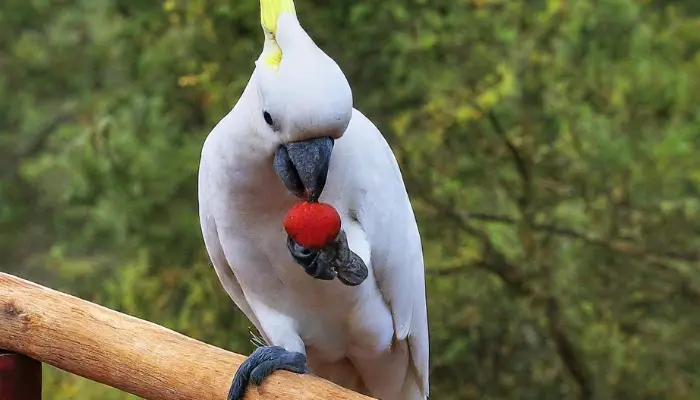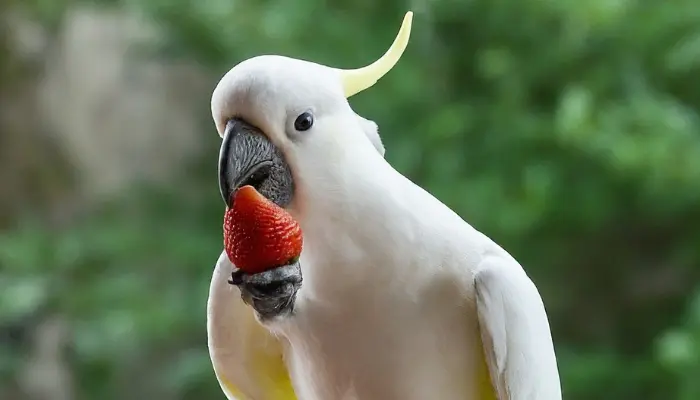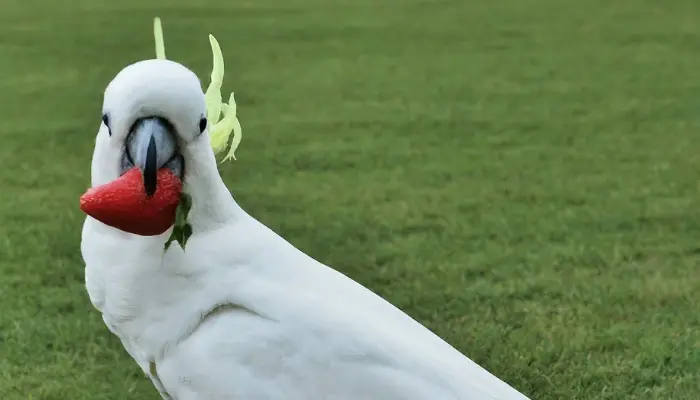Yes, cockatoos can eat strawberries in moderation. Strawberries are safe for cockatoos to consume and can be a tasty treat for them. However, like with any new food introduced to a bird’s diet. It is essential to start with small amounts to see how they react and to ensure they don’t have any adverse reactions. Also, make sure to thoroughly wash the strawberries to remove any pesticides or residues before offering them to your cockatoo.
Exploring the Nutritional Values of Strawberries
Strawberries are not just delicious; they are also packed with essential nutrients. Here is a rundown of their nutritional value:
- Vitamins and Minerals: Strawberries are an excellent source of vitamin C, which supports the immune system and helps in collagen production. They also contain significant amounts of manganese, which plays a role in metabolism and bone health.
- Fiber: A serving of strawberries provides a good amount of dietary fiber, which aids in digestion, helps control blood sugar levels, and promotes a feeling of fullness.
- Antioxidants: Strawberries are rich in antioxidants like flavonoids, phenolic compounds, and ellagic acid, which help neutralize free radicals in the body, reducing oxidative stress and inflammation. These antioxidants are linked to various health benefits, including a reduced risk of chronic diseases like heart disease and cancer.
- Low in Calories: Despite their sweet taste, strawberries are relatively low in calories, making them a great option for those watching their calorie intake.
- Hydration: Strawberries have a high water content, contributing to hydration, which is essential for overall health and proper bodily functions.
- Folate: Strawberries contain folate, a B-vitamin important for cell division and DNA synthesis. Adequate folate intake is especially crucial during pregnancy to prevent neural tube defects in the developing fetus.
- Anthocyanins: The vibrant red color of strawberries is due to anthocyanins, which are potent antioxidants associated with numerous health benefits, including improved heart health and cognitive function.
Incorporating strawberries into your diet can be as simple as enjoying them fresh as a snack, adding them to salads, smoothies, or yogurt, or using them in desserts like pies and tarts. Just remember to wash them thoroughly to remove any pesticides or contaminants before consuming.
Nutritional Needs of a Cockatoo
Cockatoos like all parrots have specific nutritional needs to maintain their health and vitality. Here is a general overview.
- Pelleted Diet: A high-quality pelleted diet formulated specifically for cockatoos is essential. These pellets should make up the majority of the bird’s diet. Look for pellets that are free from artificial colors and flavors. Pellets provide balanced nutrition and ensure that the bird gets all the essential vitamins and minerals it needs.
- Fresh Fruits and Vegetables: Cockatoos should also be offered fresh fruits and vegetables daily. These should include a variety of options such as apples, oranges, grapes, carrots, broccoli, leafy greens, and more. These provide important vitamins, minerals, and antioxidants.
- Healthy Seeds and Nuts: While seeds and nuts are high in fat and should be given in moderation, they can be a healthy addition to a cockatoo’s diet. Examples include sunflower seeds, pumpkin seeds, almonds, and walnuts. These should only make up a small portion of the bird’s diet.
- Calcium: Cockatoos have high calcium requirements, especially during breeding or egg-laying periods. Providing a calcium supplement or offering calcium-rich foods like cuttlebone can help meet this need.
- Water: Fresh, clean water should be available at all times.
It’s important to consult with an avian veterinarian or a qualified avian nutritionist to ensure that your cockatoo’s diet meets its specific needs, as individual birds may have unique dietary requirements or health considerations.


